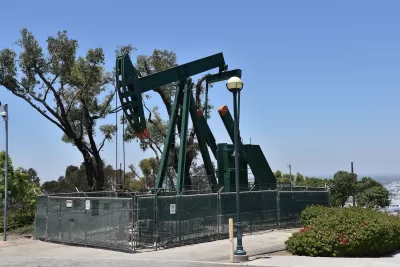The signed legislation grants local communities more authority to restrict oil and gas operations near sensitive areas and address the environmental risks of idle wells, while also ensuring the permanent shutdown of low-production wells.

Governor Gavin Newsom has signed three new laws aimed at restricting oil and gas operations near schools, daycares, and residential communities. These laws grant local governments the authority to limit or ban oil and gas activities within their jurisdictions, empowering cities and counties to protect vulnerable populations from the harmful effects of industrial operations. This legislation also addresses previous legal challenges that had blocked local ordinances, allowing communities to move forward with stronger protections.
In addition to granting local control, the new laws tackle the environmental risks posed by idle oil and gas wells. These wells, often left unattended and unsealed, present a danger to surrounding neighborhoods. The legislation increases fees on idle wells and requires oil companies to decommission them more quickly, preventing potential leaks and contamination. This proactive approach is intended to hold oil companies accountable for the maintenance and safe closure of wells across the state.
One of the laws specifically targets the Inglewood Oil Field, California’s largest urban oil field, where low-production wells will now be shut down permanently. Companies operating these wells will face monthly fines until the wells are plugged and abandoned, with the penalty funds allocated to community improvement projects like parks. These laws are part of California’s broader strategy to reduce pollution and safeguard public health, while holding the oil industry accountable for its impact on local communities.

Planetizen Federal Action Tracker
A weekly monitor of how Trump’s orders and actions are impacting planners and planning in America.

Canada vs. Kamala: Whose Liberal Housing Platform Comes Out on Top?
As Canada votes for a new Prime Minister, what can America learn from the leading liberal candidate of its neighbor to the north?

The Five Most-Changed American Cities
A ranking of population change, home values, and jobs highlights the nation’s most dynamic and most stagnant regions.

San Diego Adopts First Mobility Master Plan
The plan provides a comprehensive framework for making San Diego’s transportation network more multimodal, accessible, and sustainable.

Housing, Supportive Service Providers Brace for Federal Cuts
Organizations that provide housing assistance are tightening their purse strings and making plans for maintaining operations if federal funding dries up.

Op-Ed: Why an Effective Passenger Rail Network Needs Government Involvement
An outdated rail network that privileges freight won’t be fixed by privatizing Amtrak.
Urban Design for Planners 1: Software Tools
This six-course series explores essential urban design concepts using open source software and equips planners with the tools they need to participate fully in the urban design process.
Planning for Universal Design
Learn the tools for implementing Universal Design in planning regulations.
New York City School Construction Authority
Village of Glen Ellyn
Central Transportation Planning Staff/Boston Region MPO
Institute for Housing and Urban Development Studies (IHS)
City of Grandview
Harvard GSD Executive Education
Regional Transportation Commission of Southern Nevada
Toledo-Lucas County Plan Commissions





























